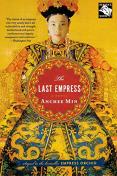BKMT READING GUIDES
The Last Empress: A Novel
by Anchee Min
Paperback : 336 pages
1 club reading this now
1 member has read this book
Introduction
The Last Empress is the story of Orchid’s dramatic transition from a strong-willed, instinctive young woman to a wise and politically savvy leader who ruled China for more than four decades. In this concluding volume Min gives us a compelling, very human leader who assumed power reluctantly and sacrificed all to protect those she loved and an empire that was doomed to die.
Editorial Review
Power is a here-today, gone-tomorrow concept in Chinese history, especially for women. In her previous novel, Empress Orchid, Anchee Min covered the first part of the life of Tzu Hsi, or Empress Orchid. Now, in The Last Empress, the empress is a widow, mother of the only male heir of the now-deceased emperor, and in a formidable position. Still, she must contend with palace intrigue on all fronts; even her eunuchs are bribed. She must put up with the smiling faces of men and women who mean her great harm, and, worst of all, her son takes up with prostitutes and dies of veneral disease. She adopts her nephew to be emperor, treats him like a son, and despairs of his weakness. Constant deceit is not the only difficulty which must be faced: incursions of foreigners and domestic rebellion are also part of this violent period at the end of the 19th century. There is the love-hate relationship with the Japanese, the Boxer Rebellion, and widespread mistrust of Western foreigners. Yet Empress Orchid believes that they must appease these factions in order to preserve the dynasty and the throne. All these problems converge to bring the Ch'ing Dynasty to its eventual demise.A disclaimer: do not read The Last Empress as straight historical fact. Anchee Min makes no bones about the fact that her writing is meant to "rehabilitate" crucial female figures in Chinese history. Whichever account of Tzu Hsi is correct, the historical tradition that she was an overbearing harridan, selfish, greedy, and bloodthirsty or Min's portrayal of her as a loving mother, trying to protect her country and longing to step down but prevented from doing so by her wishy-washy son, The Last Empress is an endlessly interesting look at palace life, that hermetically sealed world that once existed in China. --Valerie Ryan
Discussion Questions
No discussion questions at this time.Book Club Recommendations
Recommended to book clubs by 0 of 0 members.
Book Club HQ to over 90,000+ book clubs and ready to welcome yours.
Get free weekly updates on top club picks, book giveaways, author events and more








